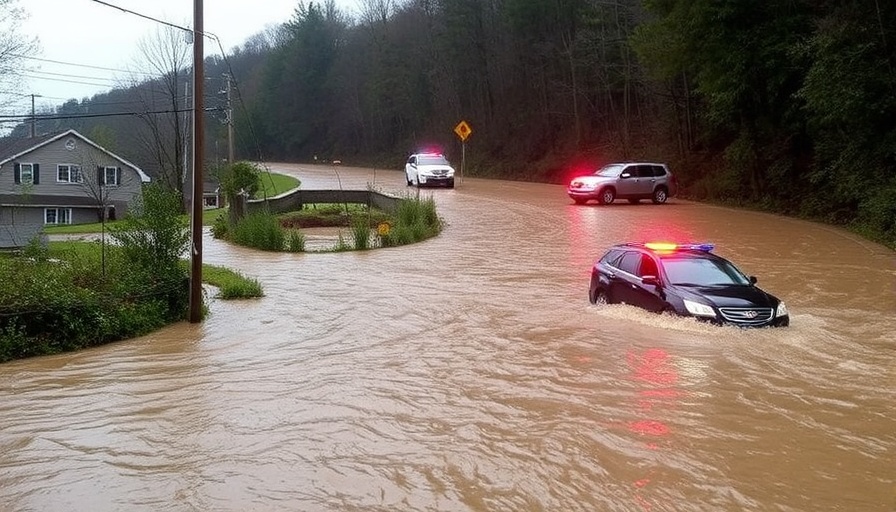
Legal Battles Heat Up Over Accountability for Climate Crisis
In an unexpected legal maneuver, the U.S. Department of Justice (DOJ) has taken a bold step, suing several states, including Michigan and Hawaii, to block their efforts in holding fossil fuel companies accountable for the climate crisis. This action reflects a growing tension between state-level initiatives aimed at mitigating climate change and the federal government's push to protect fossil fuel interests.
The Stakes Behind the Lawsuits
These lawsuits, deemed unprecedented by legal experts, stem from states' attempts to implement what are called “climate superfund laws.” According to Attorney General Pam Bondi, these state actions pose a threat to “American energy independence” and are characterized as “burdensome” to the economy. This federal intervention raises significant questions about states' rights to legislate environmental protections and the broader implications for the climate movement.
Voices from the Frontlines
Democratic Governor of Hawaii, Josh Green, expressed the state's determination to pursue justice against fossil fuel companies, citing their contribution to devastating climatic events like the Lahaina wildfire. Governor Green asserted, "This lawsuit is about holding those parties accountable, shifting the costs of surviving the climate crisis back where they belong," underscoring the urgency of the situation for local residents.
Similarly, Michigan's Democratic Attorney General Dana Nessel remains firm in her commitment to pursue legal action against the fossil fuel industry, declaring that the DOJ's lawsuits are “frivolous” and will not deter her state's intentions. Nessel's position reflects a broader defiance against federal overreach, signaling that local governments are willing to contest existing power dynamics.
Contextualizing the Litigation Landscape
The backdrop for these legal battles is a rapidly changing climate landscape that demands urgent attention. Increasingly severe weather events have exacerbated community vulnerabilities, prompting state-level responses that seek to hold accountable those responsible for environmental harm. As states like New York and Vermont pursue their own legal frameworks to manage climate impacts, the DOJ's lawsuits could potentially derail these efforts.
Impact on Homebuyers and Property Investors
For homebuyers, sellers, and property investors in regions affected by fossil fuel companies, these developments hold considerable importance. The outcome of these lawsuits could influence property values, insurance costs, and long-term sustainability efforts within communities. As environmental regulations and climate accountability become more contentious, understanding the ramifications for the housing market is crucial.
The Bigger Picture: Climate Accountability
This confrontation between state initiatives and federal authority brings to light a critical discussion on climate accountability. As awareness surrounding climate change grows, states are increasingly positioning themselves as leaders in sustainability, often at odds with federal policy. The question remains: how much influence should states have in dictating environmental standards, particularly when local communities face the brunt of climate impacts?
What This Means for Green Living
For advocates of sustainability and green living, these lawsuits indicate the ongoing struggle against fossil fuel dependency. Embracing eco-friendly practices in home design not only aligns with environmental responsibility but can also enhance property values, especially in markets that prioritize sustainability. Homebuyers and investors are called to consider how these legal outcomes may shape future real estate investments.
Next Steps for Interested Parties
As these lawsuits unfold, it's essential for stakeholders in the housing market to engage with the evolving legal landscape. Staying informed about state and federal interactions regarding climate policy will empower consumers to make enlightened choices about where and how to invest in property. Advocating for stronger climate legislation at the local level can also be a proactive step in promoting accountability for fossil fuel companies.
In the face of ongoing climate challenges, understanding the complexities of legal responses will help in fostering a more sustainable future. By aligning investment decisions with sustainable practices, individuals can contribute to the fight against climate change while ensuring their properties reflect their values.
To keep abreast of these developments and to discover how they may affect your investment choices, consider subscribing to local environmental news and advocacy groups, which can provide critical updates and resources.
 Add Row
Add Row  Add
Add 





 Add Row
Add Row  Add
Add 








Write A Comment